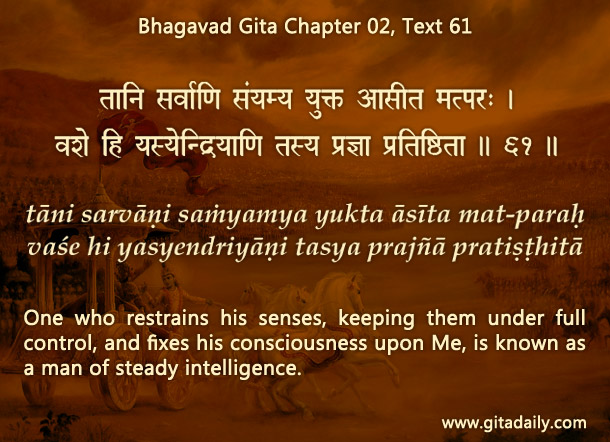Krishna’s first indirect self-revelation – The Bhagavad-gita develops its message gradually and systematically. It starts by stressing our spiritual identity (02.13) and concludes by proclaiming Krishna’s all-pervading, all-embracing divinity, thereby calling for loving harmony with him (18.66).
Still, Krishna hints at his divinity throughout the Gita’s chapters. His first self-revelation occurs in his response to Arjuna’s questions about the characteristics of the self-realized (02.54). He states that such souls withdraw their senses from tempting objects (02.58) — and complement such self-restraint by focusing their consciousness on him (02.61). Though this incidental statement occupies just one-fourth of a verse, it dramatically elevates Krishna’s position — he is not just the teacher of self-control; he is also the object of the controlled senses.
Isn’t Krishna’s divinity self-evident in the Gita? Yes, from its seventh chapter onward. In speaking the Gita, Krishna’s focus is on solving Arjuna’s ethical dilemma, not on trumpeting his own divinity. When Arjuna’s dilemma is best solved by understanding the nature and identity of the ultimate reality, only then does Krishna emphasize and explain that he is that supreme divinity.
Then, why does he hint his divinity in the Gita’s second chapter? To complete his instruction about sense control. When he describes the characteristics of the self-realized, especially their sense control, he also compassionately explains how we can achieve such sense control. He acknowledges a universal psychological reality: we can’t sustain sense control if we strive only to stay away from tempting objects; we need to find some higher meaning and fulfillment. The Gita later explains that the source of supreme meaning and fulfillment is the ultimate reality, Krishna. Nonetheless, to ensure that his instruction on sense control in the second chapter is holistic, he passingly refers to his divine position.
One-sentence summary:
Krishna’s first passing reference to his divine position reflects the Gita’s dual dynamics: the progression of its overall message and the completeness of its individual teachings.
Think it over:
- In the Gita’s flow, why is Gita 02.61 significant?
- Why does Krishna not emphasize his divinity throughout the Gita?
- Why does Krishna hint at his divinity in the Gita’s second chapter?
***
02.61: One who restrains his senses, keeping them under full control, and fixes his consciousness upon Me, is known as a man of steady intelligence.
To know more about this verse, please click on the image


Leave A Comment